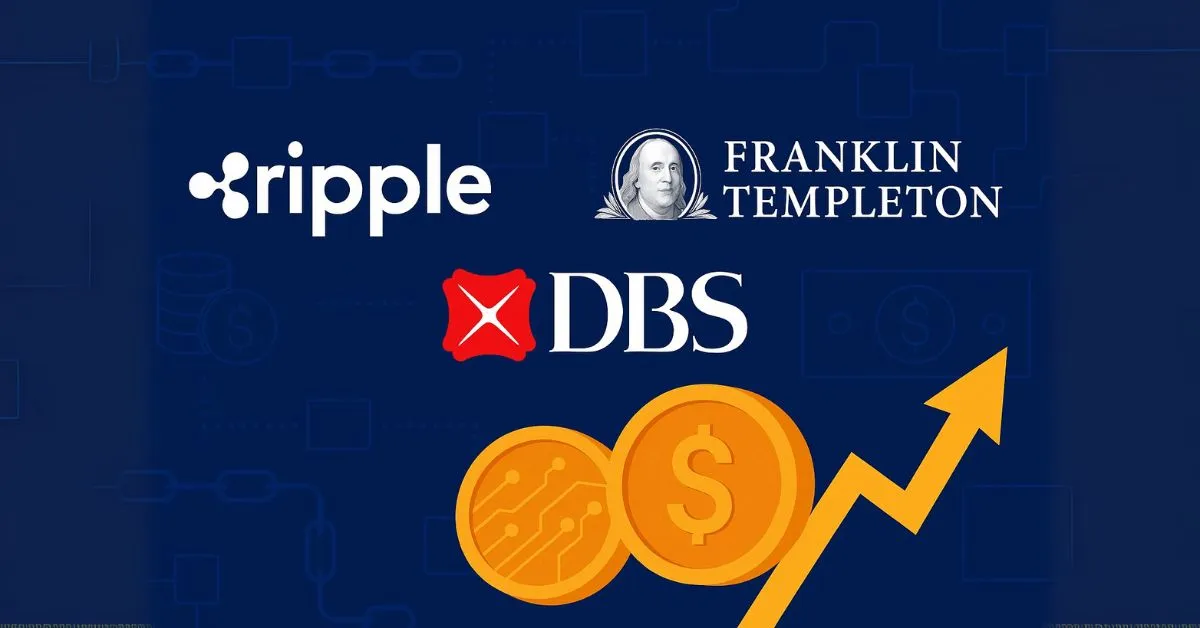
Ripple, Franklin Templeton & DBS Expand Tokenized Lending
The strategic partnership
Ripple, Franklin Templeton and DBS announced a memorandum of understanding (MoU) to work together on building token-based financial services. The goal is to merge traditional financial products, such as money market funds, with blockchain infrastructure, enabling faster settlement, broader access and new lending opportunities.
This collaboration highlights the growing institutional interest in real-world assets (RWAs) moving on-chain, and shows how traditional finance players are starting to treat blockchain as a serious platform for long-term innovation.
Franklin Templeton’s Tokenized Fund: sgBENJI
Franklin Templeton, a $1.6 trillion asset manager, will tokenize its U.S. dollar short-term money market fund on the XRP Ledger. The token, named sgBENJI, represents units of the fund and can be traded directly on-chain.
Tokenizing this type of conservative, yield-generating product is designed to make institutional investors more comfortable with blockchain-based assets, as it combines the familiarity of money market funds with the benefits of digital settlement and programmability.
Ripple’s RLUSD Stablecoin integration
Ripple will contribute its RLUSD stablecoin, issued earlier in 2025, as the liquidity backbone of the system. RLUSD provides price stability and easy transferability, allowing investors to seamlessly move between stable holdings and yield-bearing tokenized assets.
The combination of sgBENJI and RLUSD allows institutional portfolios to be rebalanced on-chain, creating new levels of capital efficiency while reducing counterparty risks associated with traditional clearing systems.
DBS digital exchange’s role
DBS Digital Exchange (DDEx), one of Asia’s leading bank-backed crypto trading platforms, will list sgBENJI alongside RLUSD. This will allow institutions to buy, sell and trade the tokens directly within a regulated environment.
DBS is also exploring how sgBENJI can be used as collateral in lending arrangements. Investors could pledge sgBENJI to borrow funds via repurchase agreements (repos) or through third-party lending platforms, with DBS serving as the collateral agent. This move could unlock new ways for institutions to access liquidity without liquidating their tokenized fund positions.
Why this partnership matters
Ripple calls the initiative a “game-changer” because it merges the stability of tokenized securities with the flexibility of stablecoins. Franklin Templeton views it as a breakthrough in expanding the utility of money market funds, while DBS emphasizes its role in improving efficiency and liquidity in global markets.
For institutions, this partnership could significantly reduce settlement times, lower transaction costs and create safer lending structures. It may also encourage regulators to view tokenized RWAs as a viable part of mainstream finance.
Future outlook
Key factors to watch include:
• Whether sgBENJI is widely adopted as collateral in institutional lending.
• The role of RLUSD in enhancing cross-border liquidity.
• Expansion of similar models by other asset managers and banks.
If successful, this collaboration could accelerate the institutional adoption of tokenized assets, setting the stage for a more efficient and liquid global financial system.
Disclaimer: This article is intended solely to provide information and market insights at the time of publication. We make no promises or guarantees regarding performance, returns, or the absolute accuracy of the data. All investment decisions are the sole responsibility of the reader.